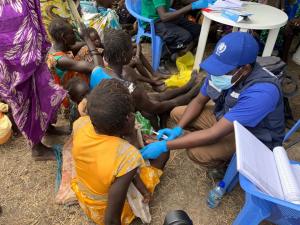Increasing access to life-saving primary healthcare services in South Sudan’s flood-affected areas
Lucia Ngacho, a 32-year-old mother of 3 children, walked to the WHO emergency medical mobile clinic in Pibor town, the regional capital of Pibor Administrative Area with her 2-year-old girl Mama Arzen.
“I never thought my daughter would be alive”, Lucia confesses adding that she appreciates the support that she received from the dedicated WHO mobile medical team.
The devastating effect of the floods has displaced Lucia and her entire neighbours and has taken a toll on her daughter Mama Arzen. “My daughter had fever and cough for the last two weeks”, says Lucia recalling her daughters’ condition. “She had not had any medication and I was worried about how sick she was”, she recalled.
The WHO mobile medical team frantically provided Mama Arzen with available treatment in the makeshift clinic, which was the only health services Lucia could access at that point in time.
“After she received her first treatment, I have started seeing the improvement with the fever gradually subsiding”, said Lucia.
WHO support to detect and control outbreaks
Since July 2020, South Sudan has been experiencing heavy rainfall and rising water levels along the White Nile, which resulted in massive flooding in over 40 Counties across the country affecting nearly one million people and subsequently resulting in widespread disruption to normal patterns of life in the affected locations.
“Flooding has contaminated water sources and destroyed health facilities, schools, houses, farms and latrines, making sanitation and disease containment efforts more difficult”, said Santino Kiron Thewa, Head, County Health Department of the Greater Pibor Administrative Area state Ministry of Health. “The needs for health care services are increasing with an increase of malaria, diarrheal diseases and measles as well as the risk of snakebites”.
Severe flooding in Greater Pibor Administrative Area displaced over 95 000 people leaving them homeless and in desperate need of humanitarian assistance.
Despite the challenges, WHO deployed the emergency Mobile Medical Team to provide the much-needed health and nutrition support to the affected populations and the most the vulnerable groups including women and children.
“Thanks to the continued support of the South Sudan Humanitarian Fund (SSHF), WHO provided outpatient curative consultations for common endemic diseases such as malaria and diarrhoeal diseases, screening of children for malnutrition, and building capacity of health workers in the area,” said Dr Olushayo Olu, WHO Representative for South Sudan.
So far, WHO has reached over 2 000 individuals with medical services, vaccinated 169 children against vaccine-preventable diseases, screened 258 children for malnutrition, and trained 80 healthcare in case management of common endemic and epidemic diseases, infection prevention and control, COVID-19 community sensitization and disease surveillance.
Besides, WHO prepositioned 221 cartons of emergency health kits in Pibor to ensure uninterrupted access to essential medicines.
WHO will continue mobile medical outreach and infectious disease surveillance activities and support the local health actors to promote ownership and sustainability of the health response in Pibor.
Technical contacts:
Dr Guracha Guyo; Email:guyoa [at] who.int (guyoa[at]who[dot]int)
Dr Chol Thabo; Email: yurc [at] who.int (yurc[at]who[dot]int)
Dr Tony Tombe; Email: wurdatt [at] who.int (wurdatt[at]who[dot]int)



